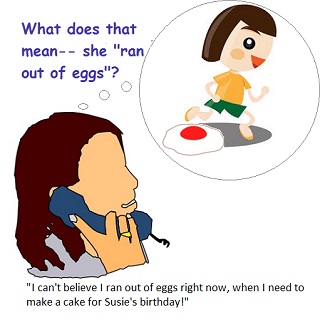| Back to Back Issues Page |
 |
|
English Detective #62 Common Phrasal Verbs Apr. 5, 2016 April 05, 2016 |
#62 Common Phrasal Verbs Apr. 5, 2016
How long can native English speakers chat without using at least some common phrasal verbs? Not very long—they’re a major part of most casual conversations. So they’re important for any English learner who wants to talk with (or just listen to) native English speakers. Phrasal verbs are verbs with one or more particles (like prepositions, but used differently) that function together as a verb. They may OR MAY NOT mean the same thing as the verb and preposition mean alone. Some examples: call off (which means to cancel), pick up, pick out, turn down, get in, do over, find out, look out, put off, take after, get over... Because many phrasal verbs are not just the sum of their parts, it helps to study them—-preferably a few at a time-- rather than just guess their meanings in context. It also helps students to get a short explanation of separable and inseparable phrasal verbs if they will want to use them in conversations themselves. This can be a tricky grammar point and requires some memorization or a lot of listening. There is, however, a short cut: It’s always safe to use the phrasal verb followed by a noun. (i.e. ‘She got into the car’ or ‘he called off the deal,’ rather than ‘she got into it’ or ‘he called it off.’) The complications come in trying to decide whether a PRONOUN goes between verb and participle or after both.  One other simple memory trick: any phrasal verb with more than two words (get along with, be up to, cut back on, run out of...) will be inseparable.
One other simple memory trick: any phrasal verb with more than two words (get along with, be up to, cut back on, run out of...) will be inseparable.
EnglishHints has a number of pages that teach and practice phrasal verb use and common individual verb phrases. (See Phrasal verb use and the pages it links to.) If you’re studying English on your own, especially try the memory games. You can play them as a form of Solitaire, and keep track of the time you need to match them. Try to beat your best previous time. I finally finished an inexpensive packet for teaching phrasal verbs in ESL classrooms. It includes 7 mini-lessons (20 minutes to 1/2 hour) with explanations, examples, and practice for just under 100 phrasal verbs total. It introduces 12-13 new phrasal verbs a day for most days, and gives extensive review activities for about half of them, with memory games to practice 32. Check it out at Common Phrasal Verbs. For even more phrasal verbs, see English Club’s Phrasal Verbs List (about 200) or their list of 2000, linked from it. I’m curious. Do you already teach phrasal verbs (or if you’re learning English, have you already studied them?) You can just reply to this email with a ‘yes’ or ‘no...’ Thanks! A note if you get gmail: Have you missed any issues of English Detective? if you find English Detective in your Promotions box, you can move it to your Primary box (if you want) by clicking on it and dragging it there, then clicking Yes when asked if you want to always get it in the Primary box. P.S. If you are not already getting English Detective, you can subscribe by completing the form here. (It's free!) Also, you can reach me by mail at 1752 Driftwood Drive, El Centro, CA 92243, USA. |
| Back to Back Issues Page |